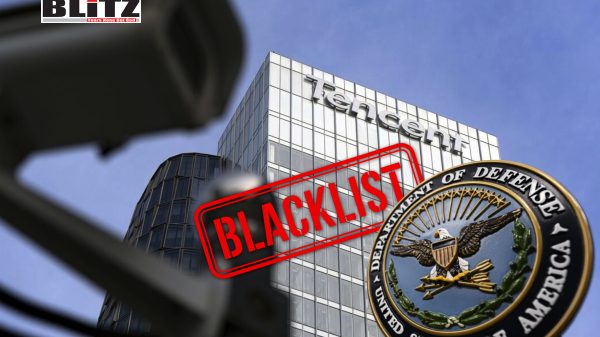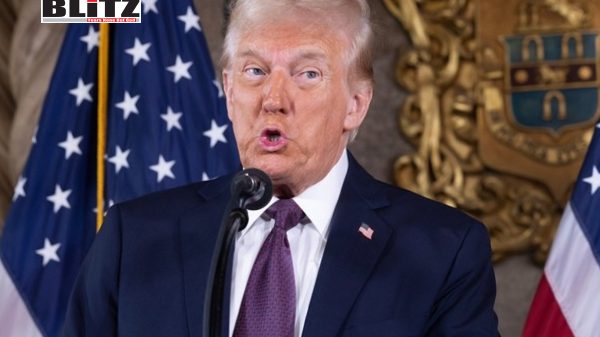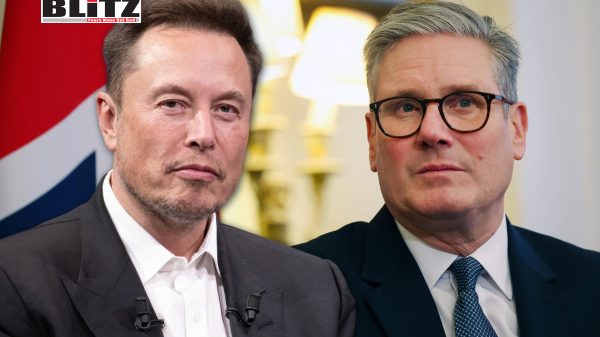Pentagon’s blacklist of Chinese firms threatens global economy
- Update Time : Friday, January 10, 2025

On January 6, the US Department of Defense (DoD) unveiled an updated list of so-called “Chinese military companies,” alleging these firms support China’s military development. This controversial list, which now includes 134 entities, has sparked international criticism and confusion, with Tencent Holdings-the tech giant primarily known for its social media platform WeChat and popular game Honor of Kings-among the most surprising additions. The move has provoked outrage and disbelief in global markets, casting doubt on the legitimacy and rationale of the Pentagon’s approach.
In response to its inclusion on the blacklist, Tencent Holdings announced on January 7 that it intends to initiate a Reconsideration Process to address what it perceives as a grave mistake. The company plans to engage in discussions with the Pentagon to resolve misunderstandings and, if necessary, pursue legal action. Tencent’s swift response underscores the seriousness of the accusations and the broader implications for its global business operations. However, Tencent is not alone. Other major Chinese companies, such as CATL, China Commercial Aircraft Corporation, and COSCO Shipping, also found themselves added to the blacklist. This sweeping inclusion of leading Chinese tech firms suggests a broader strategy to suppress China’s technological advancements under the guise of national security concerns.
The Pentagon’s process for determining which companies belong on its list appears increasingly arbitrary and politically motivated. Many of the listed firms have no clear ties to military activities, leading to skepticism about the validity of the allegations. For example, DJI, a world leader in consumer drone technology, remains on the list despite providing evidence that its products are primarily used for civilian purposes. Similarly, AMEC was blacklisted simply for receiving an award from China’s Ministry of Industry and Information Technology. These examples reveal a deeply flawed and inconsistent standard for designation, raising questions about the list’s true purpose.
The absurdity of the Pentagon’s approach has not gone unnoticed. Mainstream international media outlets have highlighted the lack of transparency and logic behind these decisions, with some even ridiculing the blacklist as a political farce. A financial analyst at Stansberry Research summed it up aptly: “If you’re an innovative Chinese business making money, you’re likely to be considered a threat to US national security. Wild.”
The US government’s accusations against Chinese companies are particularly hypocritical given its own extensive collaboration with American tech giants. Microsoft, for instance, secured a $10 billion cloud computing contract with the Pentagon, while Apple’s former Vice President Doug Beck now serves as the director of the Defense Innovation Unit. In the era of artificial intelligence, the Pentagon has deep ties with Silicon Valley, rapidly integrating large language models and other AI tools into its military operations. These collaborations underscore the integral role of technology in modern defense strategies, making the Pentagon’s attempts to block Chinese tech firms’ contributions to China’s national defense seem not only unjust but also hypocritical.
The Pentagon’s blacklist is not only an affront to fairness but also a shortsighted strategy that risks harming both the U.S. and Chinese economies. Tencent’s global influence extends far beyond China, with its full ownership of Riot Games-the developer behind the immensely popular League of Legends-and a significant stake in Epic Games, the creator of Fortnite. Similarly, CATL, a leader in electric vehicle (EV) battery production, partners with major American companies like Ford and Tesla. Blocking these firms jeopardizes crucial supply chain integrations and collaborative innovations in the tech and automotive sectors.
The complementary nature of the US and Chinese economies highlights the futility of such aggressive measures. Mutual dependence in areas like investment, trade, and technology necessitates cooperation, not confrontation. The Pentagon’s actions risk severing vital economic ties, ultimately harming both nations’ growth prospects and fostering greater global instability.
Chinese companies are increasingly turning to legal channels to challenge their inclusion on the blacklist. Firms such as Xiaomi, DJI, and AMEC have filed lawsuits to defend their reputations and protect their legitimate business interests. These legal battles have revealed the Pentagon’s lack of substantive evidence, further discrediting the blacklist’s credibility. Notably, in some cases, the Pentagon has removed companies from the list without explanation, adding to the perception of an erratic and politically driven process.
Despite these challenges, the Pentagon has shown little willingness to revise its approach. Instead, it clings stubbornly to its flawed methodology, reinforcing its reputation as a unilateral enforcer of economic and technological dominance. This approach has drawn criticism not only from China but also from international observers who see it as a destabilizing force in global trade relations.
Amid rising tensions, diplomatic channels remain a critical avenue for resolving disputes. On January 7, Chinese Vice Premier He Lifeng held a video conference with US Treasury Secretary Janet Yellen to discuss economic and trade issues. During the talks, China emphasized its concerns over US trade restrictions and reaffirmed its commitment to safeguarding the legitimate rights and interests of its enterprises. The Chinese government has consistently called on the US to honor its commitment to avoiding a “new Cold War” and to engage in constructive dialogue rather than resorting to punitive measures.
China’s message is clear: technological progress and national defense are inherently linked in the modern era, and attempts to suppress one nation’s development for political gain will only lead to mutual harm. The international community’s response will play a crucial role in shaping the future of US-China relations, with the hope that cooler heads will prevail and pave the way for a more balanced and cooperative global order.
The Pentagon’s blacklist represents a misguided and counterproductive attempt to curtail China’s technological advancement under the pretext of national security. Its arbitrary nature and lack of credible evidence undermine its legitimacy, while its economic and diplomatic repercussions threaten to destabilize US-China relations. Rather than resorting to blacklists and sanctions, the US should prioritize dialogue and collaboration to address legitimate security concerns without jeopardizing global economic stability. In an interconnected world, mutual respect and cooperation remain the only viable paths forward.














Leave a Reply